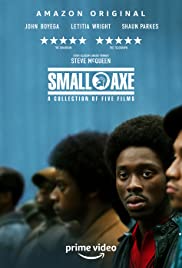 “Alex Wheatle,” Episode 4 of Steve McQueen’s Small Axe, January 15, 2021, Amazon Prime.
“Alex Wheatle,” Episode 4 of Steve McQueen’s Small Axe, January 15, 2021, Amazon Prime.
This has not been a particularly well-received episode in this series first season, but I really liked it a lot. It is somewhat more fragmented and impressionistic, but it is an excellent look at one of the central questions of the series: how do Black people in Britain come to understand, create, and recreate themselves? What does it mean to not know who you are? Or to be so different from what others say you are supposed to be? To not come from a community? To have no family? How does one come to know who we are?
This 4th episode in Steve McQueen’s series on Afro-Caribbean Britain in the 60s, 70s and 80 looks at another MBE in the process of becoming, Alex Wheatle (Sheyi Cole ): a novelist best known for his young adult fiction, playwright, and mentor. A ward of the state from infancy, we see him raised by brutal social service proctors, suffering from bed-wetting, and fighting racist thugs at school. He’s eventually ‘released’ to the community, a British-Caribbean community he barely knows. He’s British but he’s not. He’s Black but even as he adopts the language of the street, he’s cursed by an accent that reveals his origins. He has no knowledge of family or what family and home life might even be.
How to become a Black man? How to make his way through this oppressive environment? He is fortunate enough to find mentors (both wonderfully written and played) with hearts of gold: first, Dennis (Jonathon Jules), a street-runner with a heart of gold in the mold of the Artful Dodger. He builds on Wheat’s natural love of music and tries to train him to become a Black man in the city. Eventually, his rebirth as a self-aware, self-conscious man comes in prison under the tutelage of Simeon (Robbie Gee), a Rasta engaged in a lengthy hunger strike for Ital food. While Dennis teaches him the streets, to keep away from “the beast,” Simeon gets him to expand his mind. For the second time in the series—the first is in Mangrove, C.L.R. James’ classic Black Jacobins becomes the vehicle for beginning the coming to understanding of systems of racial and, with Simeon’s guidance and library, class oppression. It allows him to emerge from prison with the an idea about how to create himself in this hostile world.
And it is a hostile world. The ever-present, brutally abusive police make life a perpetual effort to avoid further incarceration. Meanwhile, assaults on the community like the New Cross Fire of 1981 (13 youth dead, 30+ terribly injured) stoke his, and his community’s rage and that explodes into the Brixton Riots.
As in the prior episodes, music is at the very heart of this story. McQueen does a wonderful piece comparing this to Roald Dahl’s love of great music. Great art, of course, means different things to different people. We hear both the beats and the words, spoken as knowledge and connection within the community. We see it in his first response to reggae beats while in youth custody, and it grows more intense as he emerges and moves onto the streets of Brixton. Music becomes a mentor, and the record store a school. He drinks in every style. He becomes a founder of Crucial Rocker and musical presence. Linton Kwezi Johnson’s “New Cross Fire” provides a tragic poetry for that moment, the horror of the event, the riots that followed and the transformative nature of the resistance for Brixton youth and Wheatle in particular.
As I mentioned before, this episode has not been as well-received as the others in this series, but I really liked it. I thought the acting excellent, and I’d be remiss if I didn’t mention Johann Myers stellar work as “Cutlass,” a local power on the streets and a mentor of a different sort, a younger version of a Black Fagin. I found the questions of identity and self-consciousness powerful even as I question each episodes’ ‘happy ending.’ In this, it is, I believe, important to keep in mind McQueen’s larger purpose in this series, his history lessons for his own community and the youth of today and years to come.